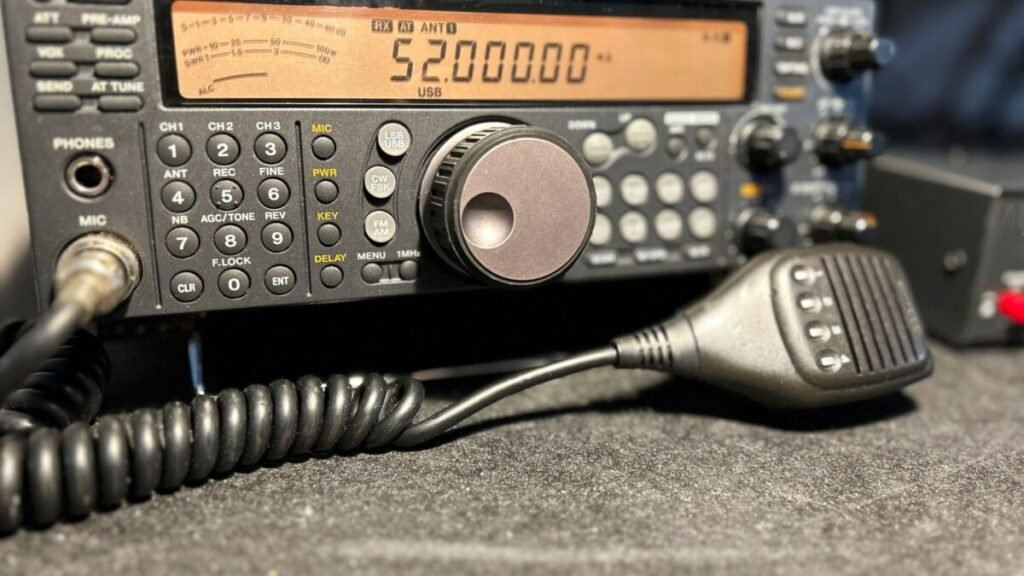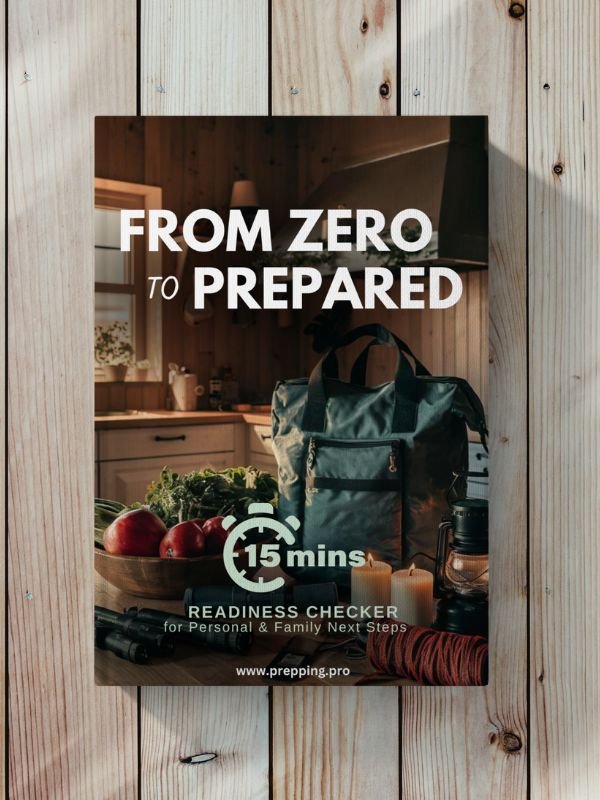As global tensions escalate and the threat of a potential world war 3 looms, it’s crucial for preppers to go beyond basic emergency preparedness for war. A full-scale international conflict could disrupt supply chains, destabilize economies, and potentially lead to civil unrest.
While no one can predict the future, taking proactive steps to develop survivalist strategies for global conflict and preparing for World War III could mean the difference between survival and dire consequences.
Preparing for a potential World War 3 scenario requires stockpiling long-term food and water supplies, securing a fortified shelter, learning essential survival skills, and developing strategic plans for navigating global unrest and civil conflicts. In this comprehensive guide, you’ll learn lifesaving strategies for world war 3 prepping.
Understanding the Risks of WW3
A third world war could stem from various catalysts, including political tensions between major powers, conflicts over natural resources, or the escalation of regional disputes. The impacts could be far-reaching and severe, leading to disruptions in food and water supplies, breakdowns in transportation and communication networks, and even the potential use of weapons of mass destruction.
Preparing for such a scenario is not about living in fear but about being proactively ready to protect yourself and your loved ones should the unthinkable occur. By understanding the potential risks and taking appropriate measures for disaster readiness for international conflicts, you can increase your chances of survival and resilience in the face of global conflict.
WW3 Prepping Checklist
- Long-Term Food and Water Storage
- Fortifying Your Home for Safety
- Essential Survival Skills
- Power and Communication Backup Plans
- Navigating Civil Unrest
- Securing Finances and Legal Protection
- Mental Preparedness
SECTION 1: Long-Term Food and Water Storage
Stockpiling Non-Perishable Foods (READ MORE)
☐ Aim to have at least a year’s worth of non-perishable foods stored
☐ Focus on calorie-dense, nutrient-rich foods with long shelf lives
☐ Rotate and replenish your stockpile regularly
Water Purification and Storage Methods (READ MORE)
☐ Store at least 1 gallon of water per person per day
☐ Invest in a high-quality water filtration system
☐ Learn how to purify water from various sources (boiling, chemical treatment, etc.)
Growing Your Own Food (READ MORE)
☐ Consider setting up a survival garden or greenhouse
☐ Learn techniques for seed saving and plant propagation
☐ Stockpile gardening tools, seeds, and other necessary supplies
SECTION 2: Fortifying Your Home for Safety
Choosing The Right Shelter (READ MORE)
☐ Evaluate the structural integrity of your home or consider a more secure location
☐ Basements or underground shelters offer better protection
☐ Ensure adequate ventilation and access to essential utilities
Reinforcing Windows And Doors (READ MORE)
☐ Install impact-resistant windows or add protective coverings
☐ Reinforce doors with heavy-duty locks and hinges
☐ Establish a safe room or panic room for emergencies
Creating a Safe Room (READ MORE)
☐ Identify an interior room with minimal windows and solid walls
☐ Stockpile emergency supplies (food, water, first aid, etc.)
☐ Consider adding a fortified door and communication devices
SECTION 3: Essential Survival Skills
First Aid Medical Training (READ MORE)
☐ Learn basic first aid techniques and how to treat common injuries
☐ Stockpile necessary medical supplies and medications
☐ Consider taking advanced medical training courses
Self-Defense And Weapons Handling (READ MORE)
☐ Gain proficiency in self-defense techniques
☐ Understand local laws and regulations regarding weapons
☐ Seek proper training if you plan to own firearms
Wilderness Survival Techniques (READ MORE)
☐ Learn how to build shelters, start fires, and purify water
☐ Practice navigation and foraging skills
☐ Gain knowledge of local edible plants and wildlife
SECTION 4: Power and Communication Backup Plans
Renewable Energy Sources (READ MORE)
☐ Invest in solar panels, wind turbines, or generators
☐ Stockpile fuel for generators and maintain them regularly
☐ Learn how to operate and maintain your renewable energy systems
Ham Radio And Satelite Communication (READ MORE)
☐ Obtain the necessary licenses and equipment for ham radio communication
☐ Consider investing in satellite phones or other off-grid communication devices
☐ Establish communication protocols with your network
Creating a Secure Network (READ MORE)
☐ Form a trusted network of like-minded preppers in your area
☐ Establish secure communication channels and protocols
☐ Coordinate strategies for mutual assistance and support
SECTION 5: Navigating Civil Unrest
Developing Evacuation Routes (READ MORE)
☐ Identify multiple evacuation routes from your home and community
☐ Prepare bug-out bags with essential supplies for each family member
☐ Have a predetermined rendezvous point or safe haven
Forming a Reliable Community (READ MORE)
☐ Connect with like-minded individuals in your area
☐ Establish a network for sharing resources and information
☐ Assign roles and responsibilities within your community
Handling Potential Threats (READ MORE)
☐ Learn de-escalation techniques and conflict resolution strategies
☐ Understand local laws and regulations regarding self-defense
☐ Have a plan for defending your property and loved ones, if necessary
SECTION 6: Securing Finances and Legal Protection
Diversifying Income Streams (READ MORE)
☐ Explore alternative sources of income beyond traditional employment
☐ Invest in tangible assets like precious metals or real estate
☐ Develop skills for bartering or earning income off-grid
Obtaining Necessary Documentation (READ MORE)
☐ Secure copies of important documents (birth certificates, passports, etc.)
☐ Consider obtaining legal documents for self-defense or asset protection
☐ Understand local laws and regulations regarding survival preparations
Asset Protection Strategies (READ MORE)
☐ Consult with legal and financial professionals
☐ Explore asset protection trusts or offshore accounts
☐ Develop contingency plans for safeguarding your wealth
SECTION 7: Mental Preparedness
Coping with Stress and Trauma (READ MORE)
☐ Learn stress management techniques (meditation, exercise, etc.)
☐ Develop a support system for emotional and mental well-being
☐ Seek professional help if needed for trauma or mental health issues
Maintaining Morale and Hope (READ MORE)
☐ Cultivate a positive mindset and focus on what you can control
☐ Engage in hobbies, creative pursuits, or spiritual practices
☐ Celebrate small wins and milestones along the way
Ethical Considerations (READ MORE)
☐ Reflect on your moral and ethical principles
☐ Develop a code of conduct for your community
☐ Prepare for ethical dilemmas and tough decisions
Long-Term Food and Water Storage

Ensuring access to long-term food and water supplies is paramount in a WW3 prepping scenario. Here are some key steps to take:
Stockpiling Non-Perishable Foods
- Aim to have at least a year’s worth of non-perishable foods stored
- Focus on calorie-dense, nutrient-rich foods with long shelf lives
- Rotate and replenish your stockpile regularly
Building a stockpile of non-perishable foods is essential for long-term survival during a global conflict. Aim to have enough food to sustain your family for at least a year, as supply chains and food production could be severely disrupted. Prioritize calorie-dense, nutrient-rich foods with long shelf lives, such as grains, legumes, canned goods, and powdered milk. Regularly rotate and replenish your stockpile to ensure freshness and prevent spoilage.
| Food Item | Calories per Pound | Shelf Life |
|---|---|---|
| White Rice | 1,600 | 30+ years |
| Dried Beans | 1,600 | 30+ years |
| Powdered Milk | 2,400 | 20+ years |
| Canned Meats | 1,200 | 5+ years |
Water Purification and Storage Methods
- Store at least 1 gallon of water per person per day
- Invest in a high-quality water filtration system
- Learn how to purify water from various sources (boiling, chemical treatment, etc.)
Clean water is essential for survival, so it’s crucial to have a reliable water storage and purification system in place. Store at least 1 gallon of water per person per day, and consider investing in a high-quality water filtration system that can purify water from various sources. Additionally, learn different water purification methods, such as boiling, chemical treatment, and distillation, in case your primary system fails.
Growing Your Own Food
- Consider setting up a survival garden or greenhouse
- Learn techniques for seed saving and plant propagation
- Stockpile gardening tools, seeds, and other necessary supplies
In the event of a prolonged global conflict, having the ability to grow your own food could be a game-changer. Consider setting up a survival garden or greenhouse, and learn techniques for seed saving and plant propagation. Stockpile necessary supplies, such as gardening tools, seeds (both heirloom and hybrid varieties), fertilizers, and pest control products.
Fortifying Your Home for Safety

Having a secure and fortified shelter is essential during times of global unrest. Here’s what you need to consider:
Choosing the Right Shelter
- Evaluate the structural integrity of your home or consider a more secure location
- Basements or underground shelters offer better protection
- Ensure adequate ventilation and access to essential utilities
When selecting a shelter, evaluate the structural integrity of your current home or consider a more secure location, such as a basement or underground shelter. These types of shelters offer better protection from potential threats and can help shield you from debris, blast waves, and fallout. Ensure your shelter has adequate ventilation, access to essential utilities (water, power, etc.), and enough space to accommodate your family comfortably.
Reinforcing Windows and Entrances
- Install impact-resistant windows or add protective coverings
- Reinforce doors with heavy-duty locks and hinges
- Establish a safe room or panic room for emergencies
Reinforce all potential entry points to your shelter to increase security. Install impact-resistant windows or add protective coverings, such as shutters or plywood. Reinforce doors with heavy-duty locks, hinges, and strike plates. Consider establishing a safe room or panic room within your shelter, which can serve as a last line of defense in case of a breach.
Creating a Safe Room
- Identify an interior room with minimal windows and solid walls
- Stockpile emergency supplies (food, water, first aid, etc.)
- Consider adding a fortified door and communication devices
A safe room should be an interior room with minimal windows and solid walls, ideally made of concrete or reinforced steel. Stockpile emergency supplies, such as food, water, first aid kits, and emergency lighting, in your safe room. Additionally, consider adding a fortified door and communication devices (like a ham radio) to maintain contact with the outside world.
Essential Survival Skills

In addition to stockpiling supplies for ww3, developing essential survival skills for wartime scenarios is crucial for navigating a potential conflict:
First Aid and Medical Training
- Learn basic first aid techniques and how to treat common injuries
- Stockpile necessary medical supplies and medications
- Consider taking advanced medical training courses
During a global conflict, access to medical care could be severely limited, making first aid and medical knowledge invaluable. Learn basic first aid techniques and how to treat common injuries, such as burns, fractures, and wounds. Stockpile necessary medical supplies and medications, including bandages, antiseptics, pain relievers, and any prescription drugs your family requires. Consider taking advanced medical training courses to expand your knowledge and preparedness.
Self-Defense and Weapons Handling
- Gain proficiency in self-defense techniques
- Understand local laws and regulations regarding weapons
- Seek proper training if you plan to own firearms
In a wartime scenario, the ability to defend yourself and your loved ones may become crucial. Gain proficiency in self-defense techniques, such as martial arts or hand-to-hand combat. If you plan to own weapons for self-defense, thoroughly understand your local laws and regulations regarding ownership and use. Seek proper training from certified instructors to ensure safe and responsible weapons handling.
Wilderness Survival Techniques
- Learn how to build shelters, start fires, and purify water
- Practice navigation and foraging skills
- Gain knowledge of local edible plants and wildlife
In the event of a prolonged global conflict, you may need to rely on wilderness survival skills. Learn how to build shelters, start fires, and purify water from natural sources. Practice navigation and foraging skills, and gain knowledge of local edible plants and wildlife that can be safely consumed. These skills could prove invaluable if you need to evacuate or survive in the wilderness.
Power and Communication Backup Plans

Disruptions to power grids and communication networks are likely during international conflicts. Be prepared with:
Renewable Energy Sources
- Invest in solar panels, wind turbines, or generators
- Stockpile fuel for generators and maintain them regularly
- Learn how to operate and maintain your renewable energy systems
Invest in renewable energy sources, such as solar panels, wind turbines, or generators, to ensure a reliable power supply during grid disruptions. Stockpile fuel for generators and maintain them regularly. Learn how to operate and maintain your renewable energy systems to maximize their efficiency and longevity.
Ham Radio and Satellite Communication
- Obtain the necessary licenses and equipment for ham radio communication
- Consider investing in satellite phones or other off-grid communication devices
- Establish communication protocols with your network
Conventional communication networks may be compromised during a global conflict. Consider obtaining the necessary licenses and equipment for ham radio communication, which can provide a reliable means of communication even when traditional networks are down. Additionally, invest in satellite phones or other off-grid communication devices to stay connected with your network.
Creating a Secure Network
- Form a trusted network of like-minded preppers in your area
- Establish secure communication channels and protocols
- Coordinate strategies for mutual assistance and support
Forming a trusted network of like-minded preppers in your area can be invaluable during a crisis. Establish secure communication channels and protocols to share information and coordinate strategic planning for global unrest. Assign roles and responsibilities within your network for mutual assistance and support.
Navigating Civil Unrest

Global unrest and potential civil conflicts are real possibilities during a world war scenario. Be prepared with:
Developing Evacuation Routes
- Identify multiple evacuation routes from your home and community
- Prepare bug-out bags with essential supplies for each family member
- Have a predetermined rendezvous point or safe haven
In the event of civil unrest or the need to evacuate your area, having a well-planned escape route is essential. Identify multiple evacuation routes from your home and community, taking into account potential roadblocks or obstructions. Prepare bug-out bags with essential supplies, such as food, water, first aid kits, and emergency gear, for each family member. Additionally, have a predetermined rendezvous point or safe haven where you can regroup and seek shelter.
Forming a Reliable Community
- Connect with like-minded individuals in your area
- Establish a network for sharing resources and information
- Assign roles and responsibilities within your community
During a crisis, working together as a community can greatly increase your chances of survival. Connect with like-minded individuals in your area and establish a network for sharing resources and information. Assign roles and responsibilities within your community, such as security, medical support, and resource management, to ensure a coordinated effort.
Handling Potential Threats
- Learn de-escalation techniques and conflict resolution strategies
- Understand local laws and regulations regarding self-defense
- Have a plan for defending your property and loved ones, if necessary
Civil unrest can lead to potential threats, such as looters or hostile groups. Learn de-escalation techniques and conflict resolution strategies to defuse tense situations. Understand your local laws and regulations regarding self-defense, and have a plan in place for defending your property and loved ones if necessary. However, always prioritize peaceful resolution and avoid unnecessary confrontation.
Securing Finances and Legal Protection

Protecting your assets and ensuring legal compliance is crucial during times of global conflict:
Diversifying Income Streams
- Explore alternative sources of income beyond traditional employment
- Invest in tangible assets like precious metals or real estate
- Develop skills for bartering or earning income off-grid
During a global conflict, traditional employment and income streams may be disrupted. Diversify your income by exploring alternative sources, such as freelancing, online businesses, or investing in tangible assets like precious metals or real estate. Additionally, develop skills for bartering or earning income off-grid, such as carpentry, gardening, or animal husbandry.
Obtaining Necessary Documentation
- Secure copies of important documents (birth certificates, passports, etc.)
- Consider obtaining legal documents for self-defense or asset protection
- Understand local laws and regulations regarding survival preparations
Secure copies of important documents, such as birth certificates, passports, and legal records, and store them in a safe and accessible location. Consider obtaining legal documents that may be necessary for self-defense or asset protection during a crisis. Thoroughly understand your local laws and regulations regarding survival preparations to avoid any legal issues.
Asset Protection Strategies
- Consult with legal and financial professionals
- Explore asset protection trusts or offshore accounts
- Develop contingency plans for safeguarding your wealth
Consult with legal and financial professionals to explore asset protection strategies, such as setting up asset protection trusts or offshore accounts. Develop contingency plans for safeguarding your wealth and assets in case of economic turmoil or civil unrest. Consider diversifying your investments and keeping a portion of your assets in tangible forms, such as precious metals or real estate.
Mental Preparedness

Psychological resilience is just as important as physical preparedness during a survivalist scenario:
Coping with Stress and Trauma
- Learn stress management techniques (meditation, exercise, etc.)
- Develop a support system for emotional and mental well-being
- Seek professional help if needed for trauma or mental health issues
The stress and trauma associated with a global conflict can take a significant toll on mental health. Learn stress management techniques, such as meditation, exercise, or journaling, to help cope with the psychological demands of a survivalist scenario. Develop a support system of trusted individuals who can provide emotional and mental support. If you or a loved one experiences severe trauma or mental health issues, seek professional help from a therapist or counselor.
Maintaining Morale and Hope
- Cultivate a positive mindset and focus on what you can control
- Engage in hobbies, creative pursuits, or spiritual practices
- Celebrate small wins and milestones along the way
Maintaining a positive mindset and a sense of hope can be challenging during times of crisis, but it is crucial for long-term survival. Cultivate a positive attitude by focusing on what you can control and letting go of what you cannot. Engage in hobbies, creative pursuits, or spiritual practices that bring you joy and fulfillment. Celebrate small wins and milestones along the way to boost morale and remind yourself of your progress.
Ethical Considerations
- Reflect on your moral and ethical principles
- Develop a code of conduct for your community
- Prepare for ethical dilemmas and tough decisions
During a global conflict, you may face ethical dilemmas and difficult decisions. Reflect on your moral and ethical principles, and develop a code of conduct to guide your actions. If you are part of a community, collaborate to establish a shared set of values and guidelines. Prepare for potential ethical challenges by considering various scenarios and how you would respond while upholding your values.
Conclusion
Preparing for a potential world war 3 scenario requires a comprehensive approach that goes beyond basic prepping. By stockpiling long-term supplies, fortifying your home, developing essential skills, securing backup plans, and cultivating mental resilience, you can increase your chances of survival in the face of global conflict. Remember, preparedness is not about living in fear but about being proactive and taking responsible steps to protect yourself and your loved ones.
WW3 Survival Checklist:
- Stockpile at least a year’s worth of non-perishable foods and water
- Set up a secure shelter with reinforced windows, entrances, and a safe room
- Learn essential survival skills (first aid, self-defense, wilderness survival)
- Establish backup power and communication plans (renewable energy, ham radio)
- Develop evacuation routes and form a reliable prepper community
- Secure important documents and explore asset protection strategies
- Cultivate mental resilience through stress management and ethical practices
- Regularly review and update your preparedness plan
Remember, being prepared for a potential world war 3 scenario is not about living in fear but about taking responsible steps to protect yourself and your loved ones should the unthinkable occur. Stay vigilant, stay informed, and always prioritize your safety and well-being.


